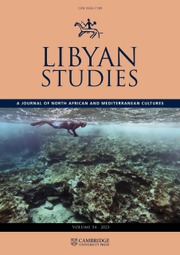Article contents
Tripoli in the late Seventeenth Century: The Economics of corsairing in a ‘Sterill Country’
Published online by Cambridge University Press: 03 March 2015
Abstract
The economic poverty of Tripoli in the Seventeenth century was such that the piratical activities of its corsair fleet were of major importance to both the town and the Ottoman regime. An unpublished journal written by Thomas Baker (British Consul between 1679–1685) contains detailed information about the arrival and departure of both merchant ships and corsairs and about the value of prizes taken by the pirates and brought to Tripoli. These data are of great value in demonstrating the impact of the corsairs on the political and economic relationships of Tripoli with the European powers. If the corsairing was too successful, Tripoli was liable to be attacked by these powers. But on the other hand, when the authorities were constrained by treaties with the Europeans to limit the activities of the corsairs, the resulting economic hardship threatened the internal stability of the regime.
- Type
- Articles
- Information
- Copyright
- Copyright © Society for Libyan Studies 1985
References
- 2
- Cited by




